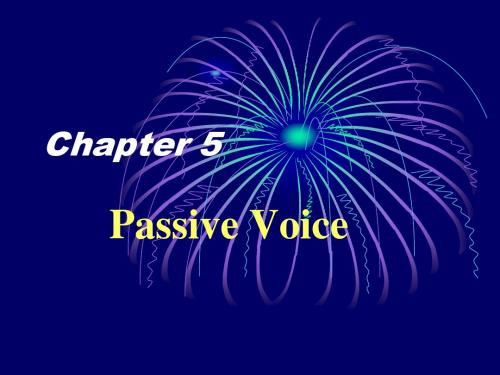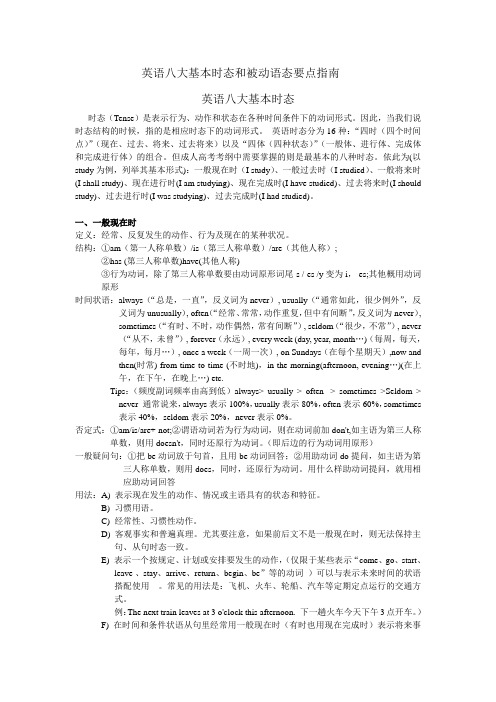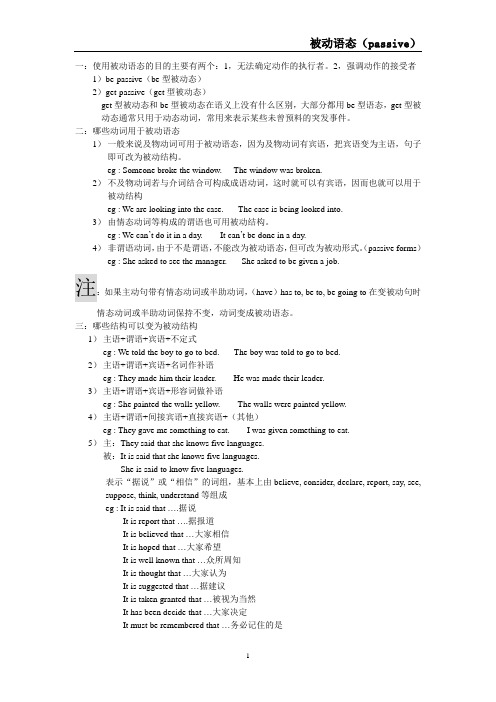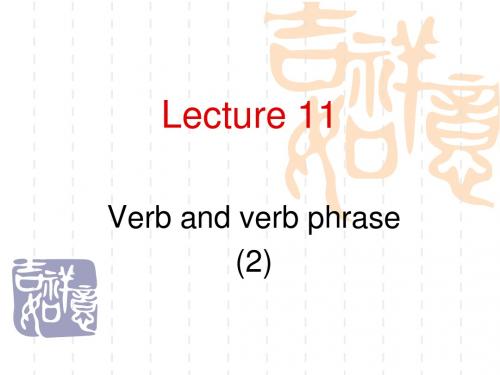美语中be-passive与get-passive的变化趋势分析——基于大型美语语料库COHA和COCA的研究
- 格式:pdf
- 大小:353.72 KB
- 文档页数:5


英语八大基本时态和被动语态要点指南英语八大基本时态时态(Tense)是表示行为、动作和状态在各种时间条件下的动词形式。
因此,当我们说时态结构的时候,指的是相应时态下的动词形式。
英语时态分为16种:“四时(四个时间点)”(现在、过去、将来、过去将来)以及“四体(四种状态)”(一般体、进行体、完成体和完成进行体)的组合。
但成人高考考纲中需要掌握的则是最基本的八种时态。
依此为(以study为例,列举其基本形式):一般现在时(I study)、一般过去时(I studied)、一般将来时(I shall study)、现在进行时(I am studying)、现在完成时(I have studied)、过去将来时(I should study)、过去进行时(I was studying)、过去完成时(I had studied)。
一、一般现在时定义:经常、反复发生的动作、行为及现在的某种状况。
结构:①am(第一人称单数)/is(第三人称单数)/are(其他人称);②has (第三人称单数)have(其他人称)③行为动词,除了第三人称单数要由动词原形词尾-s /-es /y变为i,-es;其他概用动词原形时间状语:always(“总是,一直”,反义词为never), usually(“通常如此,很少例外”,反义词为unusually), often(“经常、常常,动作重复,但中有间断”,反义词为never),sometimes(“有时、不时,动作偶然,常有间断”), seldom(“很少,不常”), never(“从不,未曾”), forever(永远), every week (day, year, month…)(每周,每天,每年,每月…), once a week(一周一次), on Sundays(在每个星期天),now andthen(时常) from time to time (不时地),in the morning(afternoon, evening…)(在上午,在下午,在晚上…) etc.Tips:(频度副词频率由高到低)always> usually > often > sometimes >Seldom >never 通常说来,always表示100%,usually表示80%,often表示60%,sometimes表示40%,seldom表示20%,never表示0%。

透析中考英语语法被动语态考点【语态命题趋势与预测】根据对语态部分全国各地中考试题的分析可知,今后该部分将是重点考查点之一。
其考查重点为:1.被动语态在各个时态中的用法2. “get+过去分词”结构的用法【考点诠释】一、各种时态的被动语态被动语态由“be+过去分词”构成,be随时态的变化而变化,高考对被动语态的考查通常从以下九种时态人手。
1.一般现在时表示现在或经常发生的被动动作时,用一般现在时的被动语态。
一般现在时的被动语态由"am / is / are+及物动词的过去分词(+by+实施者)”构成。
【考例1. The 01ympk Games every four years.北京市]A are heldB were held C.are holding D.will ho1d[答案]A。
[解析]考查被动语态,根据句意,“奥运会每四年举行一次”可见须用一般现在时的被动语态,故排除了B、C、D。
In the art show, a lot of enjoyment __to foreign friends by the Chinese paintings [沈阳市]A. is giving B is given C will give D has given[答案]B。
[解析]本题考查被动语态,句中a lot of enjoyment是动作的承受者。
“在这次艺术展中,一些有趣的东西通过中国国画展示给外国朋友。
”Today Chinese is becoming more and more popular. It _________ in. many schools around the world. [南京市]A. teachesB. is teachingC. has taughtD. is taught[答案]D。
[解析]考查被动语态。
物作主语,一般要考虑被动语态。
但如果动词指的是物的特性,不能用被动语态。

一:使用被动语态的目的主要有两个:1,无法确定动作的执行者。
2,强调动作的接受者1)be-passive(be型被动态)2)get-passive(get型被动态)get型被动态和be型被动态在语义上没有什么区别,大部分都用be型语态,get型被动态通常只用于动态动词,常用来表示某些未曾预料的突发事件。
二:哪些动词用于被动语态1)一般来说及物动词可用于被动语态,因为及物动词有宾语,把宾语变为主语,句子即可改为被动结构。
eg : Someone broke the window.----The window was broken.2)不及物动词若与介词结合可构成成语动词,这时就可以有宾语,因而也就可以用于被动结构eg : We are looking into the case.-----The case is being looked into.3)由情态动词等构成的谓语也可用被动结构。
eg : We can’t do it in a day.------It can’t be done in a day.4)非谓语动词,由于不是谓语,不能改为被动语态,但可改为被动形式。
(passive forms)eg : She asked to see the manager.-----She asked to be given a job.注:如果主动句带有情态动词或半助动词,(have)has to, be to, be going to在变被动句时情态动词或半助动词保持不变,动词变成被动语态。
三:哪些结构可以变为被动结构1)主语+谓语+宾语+不定式eg : We told the boy to go to bed.-----The boy was told to go to bed.2)主语+谓语+宾语+名词作补语eg : They made him their leader.------He was made their leader.3)主语+谓语+宾语+形容词做补语eg : She painted the walls yellow.------The walls were painted yellow.4)主语+谓语+间接宾语+直接宾语+(其他)eg : They gave me something to eat.------I was given something to eat.5)主:They said that she knows five languages.被:It is said that she knows five languages.She is said to know five languages.表示“据说”或“相信”的词组,基本上由believe, consider, declare, report, say, see, suppose, think, understand等组成eg : It is said that ….据说It is report that ….据报道It is believed that …大家相信It is hoped that …大家希望It is well known that …众所周知It is thought that …大家认为It is suggested that …据建议It is taken granted that …被视为当然It has been decide that …大家决定It must be remembered that …务必记住的是四:短语动词的被动语态短语动词是一个整体,不可丢掉后面的介词或副词eg : Grandma will take care of my sister.------My sister will be taken care of by grandma.五:let的用法1)当let后只有一个单音节动词,变被动语态时,不带to 的不定式eg : They let the stranger go.-------The stranger was let go.2)当let后宾补较长时,let通常不用被动语态,而用allow或permit代替。

最全考纲词形变化分类汇总一、名词1、名词+ce 后缀变形容词confidence→confident自信的difference→different不同的evidence 证据→evident明显的independence→independent独立的intelligence 智力→intelligent聪明的patience→patient有耐心的silence→silent沉默的violence→violent暴力的2、名词+-ency 后缀变形容词emergency →emergent紧急的fluency →fluent流利的;流畅的frequency 频率→frequent频繁的efficiency→efficient有效率的tendency→tend趋向;趋势3、名词+-y 后缀变形容词anger→angry生气的cloud→cloudy多云的dirt→dirty脏的dust→dusty布满尘土的ease→easy容易的;安易的fog→foggy有雾的frost→frosty结霜的;严寒的gre ed→greedy贪吃的;贪婪的guilt→guilty内疚的;有罪的health→healthy健康的hunger→hungry饥饿的ice→icy结冰的mess→messy杂乱的mist→misty有雾的noise→noisy吵闹的;嘈杂的salt→salty咸的sleep→sleepy困的snow→snowy有雪的storm→stormy暴风雨的sun→sunny晴朗的taste→tasty可口的;好吃的thirst→thirsty渴的;渴望的wealth→wealthy富有的wind→windy有风的year→yearly每年的4、名词+-ly 后缀变形容词brother→brotherly兄弟般的day→daily每天的friend→friendly友好的month→monthly每月的quarter→quarterly每季的week→#weekly每周的5、以t 结尾的形容词变名词convenient→convenience方便;便利different→difference不同;差异important→importance重要(性) significant→significance重大意义intelligent→intelligence智力6、名词+-al 后缀变形容词agriculture→agricultural农业的benefit→beneficial有益的commerce→commercial商业的convention→conventional传统的culture→cultural文化的environment→environmental环境的face→facial表面的music→musical音乐的nation→national国家的nature→natural自然的;天然的office→official官方的origin→original原来的profession→professional专业的season→seasonal季节的;季节性的society→social社会的tradition→traditional传统的7、名词/动词+-ous 后辍变形容词adventure→adventuro us 冒险的continue→continuous连续的danger→dangerous危险的humour→humorous幽默的mountain→mountainous多山的poison→poisonous有毒的8、动词+-er 后缀指物的名词cooker 炊具counter 柜台drawer 抽屉receiver 听筒;话筒speaker 扬声器typewriter 打字机9、-ician 后缀高频词汇electrician n.电工magician n.魔术师musician n.音乐家physician n.内科医生politician n.政治家technician n.技术员10、以-ist 为后缀的高频名词art→artist艺术家biology→biologist生物学家journal→journalist新闻工作者;记者physics→physicist物理学家piano→pianist钢琴家psychology→psychologist心理学家science→scientist科学家social→socialist 社会主义者special→specialist专家tour→tourist游客11、后缀“-ology”名词archaeology 考古学biology 生物学ecology 生态学geology 地质学psychology 心理学sociology 社会学technology 技术;工艺12、名词+--ic 后缀形容词drama→dramatic戏剧(性)的energy→energetic精力充沛的enthusiasm→enthusiastic热情的romance→romantic浪漫的science→scientific科学的sympathy→sympathetic同情的13、名词+-hood 后缀变名词adult→adulthood成年boy→boyhood少年时代brother→brotherhood手足之情child→childhood童年man→manhood男子气概neighbour→neighbourhood邻里;街坊14、-ship 后缀高频名词championship 冠头军衔friendship 友谊hardship 困苦;苦难leadership 领导地位;领导才能membership 成员资格relationship 关系scholarship 奖学金15、动词+-y 后缀变名词deliver→delivery运送discover→discovery发现recover→recovery康复;恢复16、动词+-ing 后缀变名词begin→beginning开始;开端build→building建筑(物)cross→crossing十字路口end→ending结局;结尾engine→engineering工程feel→feeling感觉hear→hearing听力market→marketing促销meet →meeting会议paint→painting绘画;油画spend→spending花销suffer→suffering苦难train→training训练;培养17、动词+-ment 后缀变名词acquire→acquirement n.取得accomplish→accomplishment成就achieve→achievement成就adjust→adjustment调整;调节amuse→amusement愉快;快乐;消遣announce→announcement宣告;述说appoint→appointment约会;预约;任命argue→argument争论arrange→arrangement安排assess→assessment评估assign→assignment分配;任务astonish→ast onishment 惊讶develop→development发展disappoint→disappointment失望embarrass→embarrassment尴尬employ→employment雇用enjoy→enjoyment享受;欢乐entertain→entertainment款待;娱乐equip→equipment设备establish→establishment建立govern→government统治;政府improve→improvement提高judge→judgement判断move→movement运动;移动punish→punishment惩罚settle→settlement定居;解决state→statement陈述;说明二、形容词18、-ive 后缀变形容词act→active积极的attract→attractive吸引人的cooperate→cooperative合作的impress→impressive给人印象深刻的protect→protective保护的relate→relative相关的sense→sensitive敏感的negative 消极的objective 客观的%passive 被动的positive 积极的subjective 主观的19、动词+-able 后缀变形容词accept→acceptable可接受的adjust→adjustable可调节的admire→admirable令人钦佩的afford→affordable负担得起的change→changeable易变的comfort→comfortable舒服的consider→considerable重要的;相当大的desire→desirable值得做的;可取的enjoy→enjoyable令人愉快的favour→favourable赞成的;有利的forget→forgettable健忘的honour→honourable可敬的;光荣的reach→reachable可获得的;可达到的reason→reasonable合理的rely→reliable可靠的;可信赖的remark→remarkable 不平凡的suit→suitable合适的understand→understandable可理解的value→valuable宝贵的20、动词+-ed 变形容词absorb→absorbed专心的;聚精会神的accustom→accustomed习惯的balance→balanced平衡的bury→buried专心的complicate→complicated复杂的determine→determined坚定的;有决心的devote→devoted忠实的experience→experienced有经验的learn→learned博学的limit→limited有限的organize→organized有组织的suppose→supposed应该的relate→related相关的skill→skilled熟练的unit→united联合的;统一的21、动词+-ing/+-ed 变形容词amuse→amusing好笑的;有趣的→amused愉快的astonish→astonis hing 令人惊讶的→astonished感到惊讶的bore→bored厌烦的→boring令人厌烦的confuse→confusing令人迷惑的→confused感到迷惑的convince→convincing令人信服的→convinced坚信不移的depress→depressing令人沮丧的→depressed沮丧的disappoint→disappointed失望的→disappointing令人失望的disturb→disturbing令人不安的;引起烦恼的→disturbed扰乱的;精神失常的embarrass→embarrassing令人尴尬的→embarrassed尴尬的excite→excited兴奋的→exciting令人兴奋的frighten→frightened害怕的→frightening令人害怕的relax→relaxing使人放松的→relaxed轻松的satisfy→satisfying令人满意的→satisfied对……满意的shock→shocked震惊的→shocking令人震惊的surpri se→surprised吃惊的→surprising令人吃惊的tire→tired疲劳的→tiring令人疲劳的22、动词+-tion 后缀变名词accelerate→acceleration加速accumulate→accumulation积累adapt→adaptation适应;改编addict→addiction沉溺;嗜好admire→admiration羡慕advocate→advocation拥护apply→application申请appreciate→appreciation感激;欣赏assume→assumption假定;设想celebrate→celebration庆祝classify→classification分类;归类combine→combination联合congratulate→congratulation祝贺construct→construction建筑物consume→consumption消费contradict→contradiction反驳contribute→contribution贡献cooperate→cooperation合作correct→correction改正;纠正create→creation创造;创建declare→declaration宣言;公告decorate→decoration装饰decorate→decoration装饰determine→determination决心digest→digestion消化elect→election竞选;选举erupt→eruption火山爆发evaluate→evaluation评估exhibit→exhibition展览;展览会expect→expectation期望;期待fascinate→fascination魅力;入迷graduate→graduation毕业graduate→graduation毕业hesitate→hesitation犹豫;踌躇imagine→imagination想象immigrate→immigration迁移;移居indicate→indication指示;暗示infect→infection传染interrupt→interruption中断object→objection反对occupy→occupation占领;占据organize→organization组织pollute→pollution污染predict→prediction预言prepare→preparation准备protect→protection保护recommend→recommendation推荐;介绍reflect→reflection思考;反映regulate→regulation规则;规章reject→rejection拒绝;抛弃relax→relaxation放松satisfy→satisfaction满意;满足starve→starvation挨饿;饿死substitute→substitution代替;取代translate→translation翻译transport→transportation交通23、动词+-ure 后缀变名词press→pressure压力please→pleasure乐事;快乐expose→exposure暴露;揭发fail→failure失败mix→mixture混合物24、动词+-sion 后缀变名词admit→admission容许;承认permit→permission允许impress→impression印象express→expression表情;表达revise→revision复习possess→possession拥有conclude→conclusion结论confuse→confusion困惑;混淆decide→decision决定25、动词/形容词+-ance 后缀变名词guide→guidance指导tolerate→tolerance宽容ignore→ignorance无知;愚昧appear→appearance出现important→importance重要(性) elegant→elegance优雅大方assist→assistance援助resist→resistance抵抗guide→guidance指导annoy→annoyance恼怒26、形容词+-ity 后缀变名词electric→electricity电;电流;电学equal→equality平等major→majority大多数popular→popularity受欢迎;流行real→reality现实secure→security安全similar→similarity相似点27、以“-ity”结尾的高频名词cruelty 残忍diversity 多样性necessity 必需品;需要possibility 可能性security 安全similarity 相似(性)28、形容词+-en 后缀变动词bright→brighten使愉快;使明亮broad→broaden加宽;拓宽dark→darken使变暗deep→deepen加深;使变深fright→frighten (使)惊吓hard→harden使变硬light→lighten使变轻long→lengthen加长loose→loosen (使)变松;放松;松开quick→quicken加快ripe→ripen变成熟;使成熟sharp→sharpen磨快;使锋利short→shorten变短;缩短soft→soften使变软strong→strengthen加强weak→weaken使变弱wide→widen加宽;拓宽29、形容词+-th 变名词deep→depth深;深处grow→growth成长long→length长;长度strong→strength力量true→truth真理warm→warmth温暖wide→width宽度30、形容词+-ness 变名词aware→awareness意识careless→carelessness粗心大意conscious→consciousness知觉dark→darkness黑暗eager→eagerness渴望happy→happiness幸福;高兴kind→kindness仁慈;好意lonely→loneliness孤独rude→rudeness粗鲁sad→sadness悲哀;悲伤sick→sickness疾病weak→weakness弱点;虚弱willing→willingness愿意31、含-ious 的形容词ambitious 有雄心的;野心勃勃的cautious 小心的;谨慎的conscious 有意识的envious 忌妒的;猜忌的mysterious 神秘的religious 宗教上的;信奉宗教的;虔诚的32、以“-ical”结尾的形容词economical 经济的;节约的electrical 与电有关的historical 与历史有关的logical 逻辑的magical 神奇的;像变魔术似的musical 音乐的;悦耳的political 政治的33、形容词+-ly 后缀变副词fluent→fluently流利地frequent→frequently频繁地;经常地actual→actually实际上entire→entirely完全;全部地gradual→gradually逐渐地fortunate→fortunately幸运地final→finally最后extreme→extremely极其反义词1、动词+dis-前缀变否定词agree→disagree不同意appear→disappear消失appoint→disappoint使失望approve→disapprove反对;不赞成comfort→discomfort使不舒适cover→discover发现like→dislike不喜欢2、形容词+in- 前缀变否定词accurate→inaccurate不精确的adequate→inadequate不充分的appropriate→inappropriate不合适的expensive→inexpensive不贵的;便宜的experienced→inexperienced经验不足的3、形容词+im-前缀变否定词patient→impatient不耐心的polite→impolite没礼貌的possible→impossible不可能的practical→impractical不实用的proper→improper不合适的4、形容词+un- 前缀变否定词able→unable不能的aware→unaware不知道的believable→unbelievable不可相信的certain→uncertain不确定的clear→unclear不清楚的comfortable→uncomfortable不舒服的common→uncommon不常有的conscious→unconscious失去知觉的fair→unfair不公平的forgettable→unforgettable难忘的fortunate→unfortunate不幸的fit→unfit不合适的friendly→unfrien dly 不友好的happy→unhappy不高兴的;不幸福的known→unknown无名的likely→unlikely不可能的lucky→unlucky不幸的necessary→unnecessary不必要的pleasant→unpleasant不愉快的unfortunate 不幸的unimportant 不重要的usual→unusual不寻常的willing→unwilling不情愿的5、后缀-less 构成的形容词aim→aimless无目的的care→careless粗心大意的count→countless无数的doubt→doubtless无疑的end→endless无尽的harm→harmless无害的help→helpless无助的home→homeless无家可归的hope→hopeless无希望的job→jobless失业的limit→limitless无限的rest→restless不安的use→useless无用的6、含mis-前缀的动词mistake 误会misunderstand 误解misuse 误用;滥用mislead 误导mistrust 不信任使动用法“前缀en-+形容词/名词”变动词rich→enrich使充实able→enable使能够large→enlarge使扩大sure→ensure确保;担保danger→endanger使……遭遇危险title→entitle给……起题目/命名courage→encourage鼓励含fore-前缀的单词forecast vt. 预报;预测foresee vt. 预见;预料;预知foreword n. 前言forehead n. 额头forearm n. 前臂forehead n. 额头forearm n. 前臂forecast vt. 预报foresee vt. 预见;预知foreword n. 前言foretell v. 预言;预示“-ward”后缀方位词southward 向南northward 向北eastward 向东westward 向西upward 向上backward 向后以后缀-ify 结尾的动词simple→simplify简化beauty→beautify美化pure→purify净化identity→identify鉴定;识别出class→classify分类动词+re-前缀变动词cycle→recycle再利用;回收利用use→reuse重新使用build→rebuild重建write→rewrite重写tell→retell复述男女有别词steward 乘务员;服务员stewardess 女乘务员waiter 男服务员waitress 女服务员actor 男演员actress 女演员host 男主人hostess 女主人现在分词/过去分词用作介词或连词assume→assuming假设;假定include→including包含;包括suppose→supposing假设;假如provide→provided/providing假设;如果consider→considering鉴于;考虑到concern→concerning关于give→given鉴于;考虑到。

一一一一一一一语言学研究本栏目责任编辑:谢媛媛国内外get-passives 研究综观谢竞贤,吕梦(江南大学外国语学院,江苏无锡214122)摘要:get-passives 由于其自身结构的复杂性,深受国内外学者的关注,与此同时,该结构也饱受争议。
该文立足于get-pas-sives 中心被动结构的用法,尝试从其结构界定、句法结构、语义及语用特点以及基于构式语法的分析视角出发,梳理国内外研究的主要成果及其现状,并针对其研究存在的不足,对该结构未来的研究趋势进行展望。
关键词:get-passives ;中心get-passives ;构式语法中图分类号:H314文献标识码:A文章编号:1009-5039(2017)01-0195-003get-passives 最早出现在莎士比亚的文学作品中,就其历时演变过程而言,语言学界主要持以下两种观点:以Givón &Yang(1994)为代表的部分学者认为get-passives 是由get 致使(causative)结构演变而来;而以Fleisher(2006)为代表的相关学者则认为get-passives 是由get 起始(inchoative)结构演变而来。
由于get-passives 自身结构的复杂性,一直被视为“语言学的谜题”,深受国内外学者的关注。
本文通过对国内外get-passives 的研究进行梳理与归纳,尝试呈现该语言现象目前的研究现状,继而寻找新的研究空间,以期为后续研究提供借鉴。
1get-passives 研究回顾1.1get-passives 的界定随着对get-passivse 结构研究的不断深入,学界对该结构的界定也发生了转变。
Quirk et al (1985:167-171)指出被动结构内部存在着“层级(gradience)”,即中心被动结构,半被动结构以及伪被动结构,而get-passives 隶属于边界模糊的一类结构。
英语被动语态的总结The Passive Voice in English: A Comprehensive Summary Introduction:The passive voice is an essential aspect of the English language. It is often used to shift focus from the actor to the action or to emphasize the object or recipient of an action. In the passive voice, the subject of the sentence receives the action, rather than performing it. This summary aims to provide a comprehensive understanding of the passive voice in English, including its formation, usage, and examples.Formation:The passive voice is formed using a form of the verb "to be" and the past participle form of the main verb. The verb "to be" changes according to the tense and mood of the sentence, while the past participle remains constant. The forms of "to be" used include "am, is, are, was, were, has been, have been, had been, will be, will have been, being, been." The main verb's past participle form is created by adding "-ed" or "-en" to regular verbs or following irregular verb patterns.Usage:1. Emphasizing the object or recipient of an action: The passive voice is often used when we are more interested in what happens to the object or recipient of the action rather than the person or thing performing the action. For example:- Active voice: John built the house.- Passive voice: The house was built by John.2. Shifting focus from the actor to the action: The passive voice is frequently employed to emphasize the action rather than who performed it. This is common in news headlines or scientific writing. For example:- Active voice: The dog bit the man.- Passive voice: The man was bitten by the dog.3. Lack of knowledge about the subject: In situations where the subject is unknown or irrelevant, the passive voice is used. This can occur in general statements or descriptions. For example:- Active voice: They say that ghosts haunt old houses.- Passive voice: It is said that old houses are haunted by ghosts. 4. Politeness: The passive voice is frequently used to be more polite or less direct, particularly in professional or formal contexts. For example:- Active voice: You should finish the report.- Passive voice: The report should be finished.5. Reporting actions: When reporting actions in indirect speech or writing, the passive voice is often employed. This helps maintain the original tense and context while shifting focus to the action. For example:- Direct speech: John said, "I found the wallet."- Indirect speech: John said that the wallet had been found. Common Tenses and Modal Verbs in Passive Voice:1. Present simple: The passive voice is formed using the present tense of "to be" and the past participle of the main verb. For example:- Active voice: They clean the office every day.- Passive voice: The office is cleaned every day.2. Past simple: The passive voice is formed using the past tense of "to be" and the past participle of the main verb. For example:- Active voice: The company hired new employees last year.- Passive voice: New employees were hired by the company last year.3. Present continuous: The passive voice is formed using the present continuous tense of "to be" and the past participle of the main verb. For example:- Active voice: They are building a new bridge.- Passive voice: A new bridge is being built.4. Future simple: The passive voice is formed using the future tense of "to be" and the past participle of the main verb. For example:- Active voice: They will finish the project next week.- Passive voice: The project will be finished next week.It is important to note that modals such as "can, could, may, might, must, shall, should, will, would" can also be used in passive constructions when expressing ability, necessity, permission, or other modal meanings.Conclusion:The passive voice is a crucial construction in English, allowing us to emphasize the object or recipient of an action or shift focus from the actor to the action. By understanding its formation and usage, one can effectively communicate in different contexts, whether it be formal writing, scientific reporting, or simply expressing politeness. Moreover, mastering the different tenses and modal verbs in passive voice construction enhances one's language skills and overall fluency in English.。
对COCA和COHA的比较研究
刘寒冰
【期刊名称】《陕西教育(高教)》
【年(卷),期】2013(000)001
【摘要】对语料库的研究在中外已经取得了很大的进步,许多双语和多语语料库的建立和成熟也加强了语言之间的交流.COCA(美国当代英语语料库)和COHA(美国近当代英语语料库)是由Brigham Young University的Mark Davies开发的两款不同的语料库,前者以美国当代英语的语料库为主,后者则包含了从1810年至2009年间的英语语料.文章将以Sorry 为例,分别用COCA和COHA两种语料库对Sorry进行分析,说明两种语料库之间的相同和差异,这将有助于英语学习者在语料库中更准确地了解语言的应用和意义.
【总页数】2页(P89-90)
【作者】刘寒冰
【作者单位】咸阳师范学院外语系陕西咸阳
【正文语种】中文
【相关文献】
1.美语中be-passive与get-passive的变化趋势分析——基于大型美语语料库COHA和COCA的研究
2.VISCOCANALOSTOMY AND PHACOVISCOCANALOSTOMY: RESULTS OF CASES WITH AND WITHOUT IMPLANTS
3.拓展历史认知语言学研究新视野的工具——美语历史语料库(COHA)的应用
4.Analysis of Cocaine and Crack Cocaine via Thin Layer
Chromatography Coupled to Easy Ambient Sonic-Spray Ionization Mass Spectrometry5.Coca CoCa伸向中国的每一个角落
因版权原因,仅展示原文概要,查看原文内容请购买。